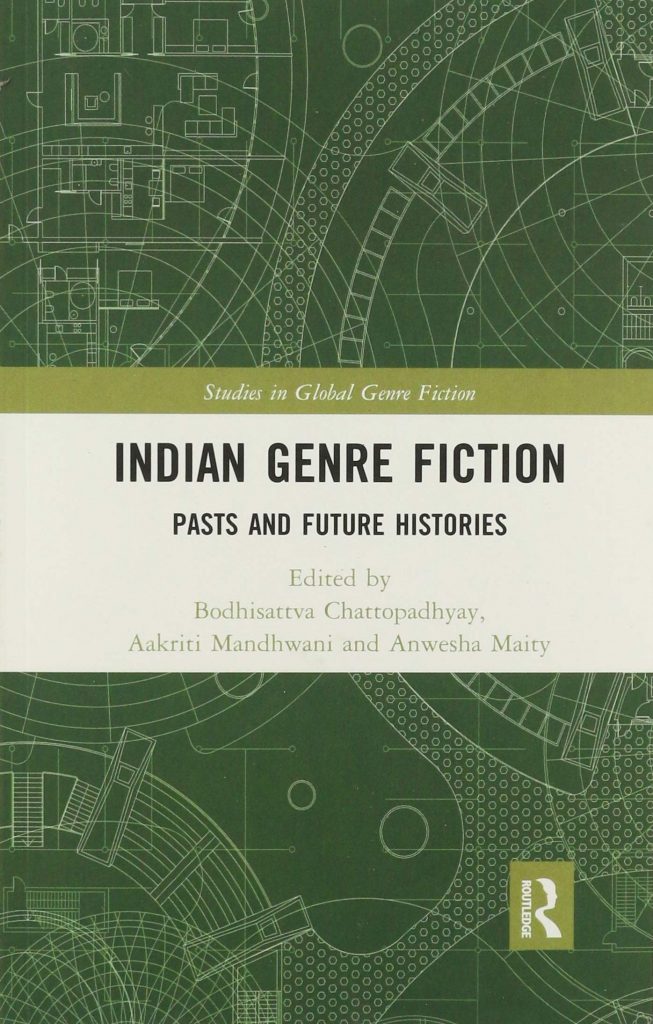Sami Ahmad Khan’s new work of critical analysis on Indian Anglophone speculative fiction, Star Warriors of the Modern Raj: Materiality, Mythology and Technology of Indian Science Fiction (University of Wales Press, 2021), is a welcome addition to the growing bookshelf of insightful works on the subject. Like me, Khan is a novelist flying the lit-crit flag as his colours of convenience, and therefore it’s not surprising that his book Star Warriors is more racily written than Suparno Banerjee’s Indian Science Fiction: Patterns, History and Hybridity (University of Wales Press, 2020), or Bodhisattva Chattopadhyay’s Indian Genre Fiction: Pasts and Future Histories (Routledge India, 2018).
My feeling is that Star Warriors is more accessible to younger desi students than the other two books which are targetted more at researchers and non-Indians. If you ask me for a study plan, I’d tell the Indian kids to read Khan as a gateway drug to Banerjee and Chattopadhyay, and everybody else to read the other two first. Khan’s menu is much richer and is likely to give the uninitiated non-Indian a bit of a Delhi belly. If you are not a STEM person, don’t be put off by Khan’s system of classifications and diagrams. Star Warriors is perfectly readable even if you don’t get that sort of thing.
Indian SF is a fast-moving target, and every critic out to capture it needs the intellectual equivalent of a telephoto lens. I can see that there are already new works of Indian SF out there that came out too late to be discussed in Star Warriors. This is inevitable, and simply means that we can expect more such reports from the frontline from all three of the scholars mentioned above, and others too.
That’s the upside: the downside is that, rather like Moore’s law, every six months we’re going to have to chuck out most of our ideas of what Indian SF is, and come up with extensively revised (or brand new) ones. This should keep Khan and friends very busy for the next few years, but it also means we might have to wait a bit before we get any more novels out of him, like Aliens in Delhi (Niyogi, 2017) or Red Jihad (Rupa, 2013).
I am very glad that Khan has stepped up to the task of chronicling the many-footed beast that is Indian SF. As a critic-novelist I have always felt inhibited from putting on my critic’s cap and flapping my lip about the competition. Therefore I have written very little about Indian SF, barring the odd book review.
Thankfully Khan has no such inhibitions, and proceeds to take us on a rollercoaster tour of all the fabulous worlds we SF writers have been making in odd corners of the Indian literary scene. I was happy to see some old friends and some new, discussed with insight, sympathy, and rigour. Star Warriors made me want to seek out a few titles that had escaped my notice when they first came out and made me feel that I really ought to read more Indian SF.
I think we are on the verge of a boom in South Asian SF, and these early ‘eyewitness’ accounts of the beginnings are going to be important anchor-points for the study of the genre. I would like to see more critics engaging with it, debating its directions and beauties, and unfolding its meanings and intentions.
Khan would agree with me that he has only scratched the surface here, and I would agree with him that we need to get away from old discourses of ‘Indianness’ and ‘authenticity’ in SF as well as other genres of Indian writing, and talk instead about the real deal: our ongoing civil war with our own otherised selves. He has provided us with an analytical structure, oriented along the axes of mythos, tech and intention, which we can use to crack open that particular can of worms.
This is a very promising step and needs further working out and application across texts both old and new. We need to create a pan-Asian discourse and include writers at work in, for example, Sri Lanka, where there is a small but flourishing SF community that, speaking personally, I’ve only just discovered.
Mainstream India is famously isolationist about other Asian cultures, always looking inwards at dry-as-dust Delhi and UP, but we marginals in the west, south and east have spent the centuries crossing the seas and mixed it up with the other sea peoples. I believe those cultural connections need to be strengthened and explored in our rapidly globalising world, and will only make Indian SF richer. Khan’s ideas provide a much-needed analytical crux which we can use as a dropped pin and origin-point to map out the many directions in which the genre is travelling at warp speed.
We also need an SF zine culture of our own, and for that we need to involve the demographic that makes things happen everywhere: kids. That’s why I’m happy that Khan’s work is so accessible to young people (even to the point of possibly putting off older ones). He begins this book, for example, with an extended dialogue between himself and a couple of clueless interlocutors of the type one runs from at corporate lit fests, and I have to admit I laughed out loud in rueful chagrin when I read it. It made me realise how thoroughly ignored Indian SF has been by both the Indianness aunties and the scientifiction dudeboys. We seem to make everyone equally uncomfortable. Damn, we must be doing something right. Read this book and take a guess on what it might be.
I unreservedly recommend Star Warriors of the Modern Raj to anyone who wants to know what the hell is going on with Indian SF.
Rimi B. Chatterjee’s novella Arisudan appears in Issue 15 of Mithila Review. You can read it here online or purchase the full issue on Gumroad.
Editor’s Recommendations:
Over the years, Mithila Review has published notes, reviews, poetry and fiction from several Indian and Indian-origin writers. Here are some suggested interviews and reviews:
- Notes on Indian Science Fiction: The Parallel Worlds of Jayant Narlikar and Vandana Singh by Salik Shah
- Indra Das: “The artist’s job is to provide the seed for an infinite tree of branching meanings, all flowering inside the hive mind of a collective human audience.”
- The East is a Setting: Issues of Place, Theme, and Tone in Ian McDonald’s River of Gods and Beyond by Gautam Bhatia
- Contingency Plans for the Apocalypse by S.B. Divya
- “All true knowing is mutual…”: Notes on Vandana Singh’s Ambiguity Machines and Other Stories by Ishita Singh
- The Wall of the Worlds by Sami Ahmad Khan
- Science, Science Fiction & South Asia: Muhammad Aurangzeb Ahmad in conversation with Sami Ahmad Khan
- Avatar: An English-Italian Anthology of Contemporary Science Fiction from India by Chaitanya Murali
The Mithila Review Show, our new podcast series, also features interviews with Indian authors. Check out the show here on Youtube.
Please subscribe and support Mithila Review to help us continue publishing the best of speculative fiction, poetry, reviews and discussions from new, emerging and award-winning authors from India and beyond.
Edited by Salik Shah









